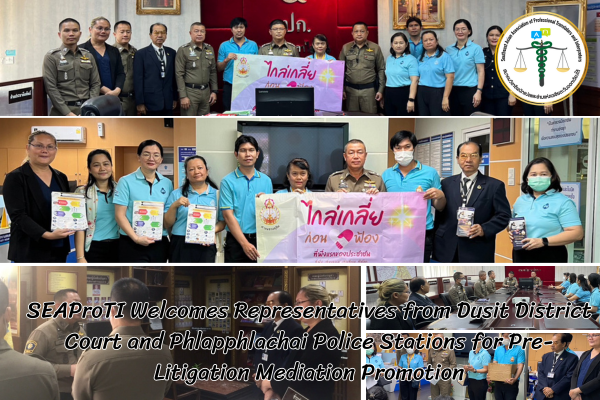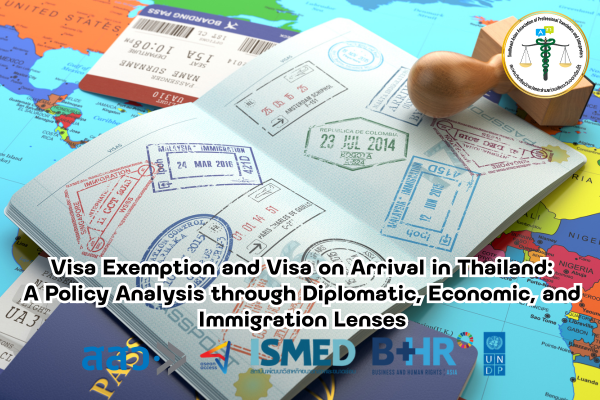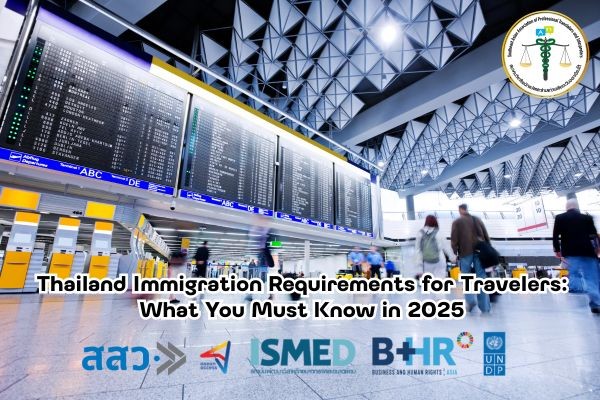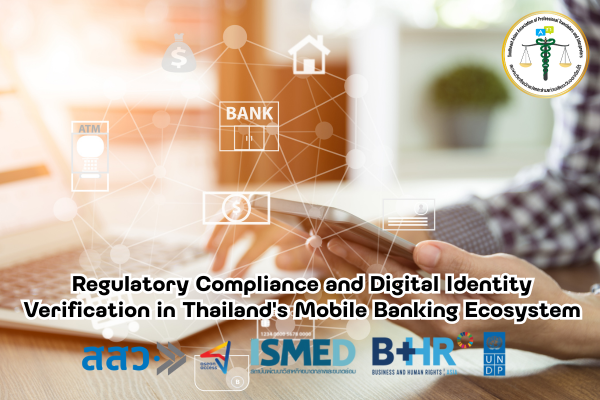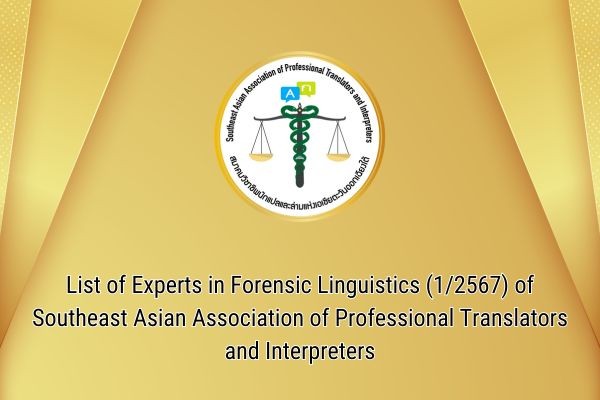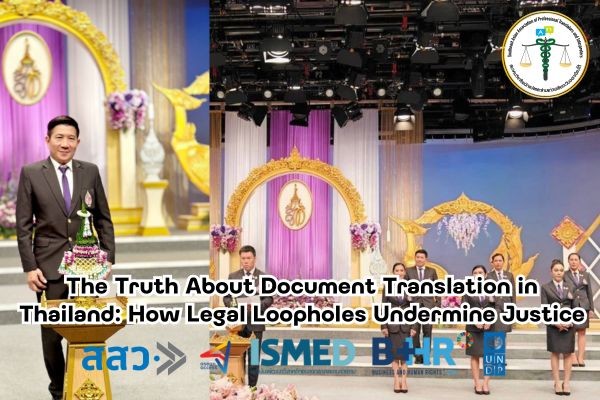The Case of an Interpreter in an Arbitration – The Influence of the Claimant’s Arbitrator on Fairness and Its Impact on Enforcement by Thai Courts
23 February 2025, Bangkok – In Thailand, the arbitration system is widely recognized through reputable institutions such as the Thailand Arbitration Institute (TAI) under the Office of the Judiciary. However, a recent real-life incident in one such Thai arbitration institute has sparked debate about fairness and the influence of individuals within the process. This case involved the claimant’s arbitrator, a renowned university professor fluent in English, who dominated proceedings and decided to replace an unqualified interpreter with the claimant’s own lawyer. This situation not only challenged the fundamental principles of arbitration but also raised questions about how Thai courts might decide on enforcing the resulting award.
The Incident
The case unfolded at a Thai arbitration institute during a complex dispute requiring translation between Thai and English to ensure the arbitrators fully understood the facts. The arbitration panel consisted of two arbitrators—one appointed by each party—and an interpreter assigned by the institute to assist with translating testimony and documents. However, during the proceedings, the claimant’s arbitrator, a distinguished university professor with strong English proficiency, criticized the appointed interpreter for being unprepared, resulting in inaccurate and confusing translations.
Rather than pausing the process to appoint a new interpreter, the claimant’s arbitrator unilaterally decided that the claimant’s lawyer—who had neither taken an oath nor qualified as an interpreter under the institute’s rules—should take over the role. This decision was justified as an urgent measure to keep the case moving forward. Notably, the respondent’s arbitrator, who appeared to hold less sway in the proceedings, did not object. It is speculated that this reluctance stemmed from the claimant’s arbitrator’s prominent reputation, which may have deterred any challenge.
The respondent immediately protested, arguing that the claimant’s lawyer had a clear conflict of interest and that translations by a biased party could distort the facts. Despite this objection, the claimant’s arbitrator dismissed it, and the process continued under their dominant influence.
Legal and Regulatory Context in Thailand
Under Thailand’s Arbitration Act B.E. 2545 (2002), adapted from the UNCITRAL Model Law, arbitration proceedings must be conducted fairly and provide equal opportunities to both parties (Section 19). Additionally, the rules of Thai arbitration institutes like TAI typically require interpreters to be neutral and, in some cases, to take an oath affirming the accuracy of their translations. The claimant’s arbitrator’s decision to appoint the claimant’s lawyer without proper qualifications or the respondent’s consent thus contravened both statutory law and institutional regulations.
Principles Challenged
This incident undermined several core principles of arbitration:
- Impartiality and Independence
Allowing the claimant’s lawyer to act as interpreter, with the backing of the claimant’s arbitrator—who wielded significant control—created an obvious risk of bias. Interpreters must remain neutral, but this arrangement fueled suspicions that the process was being manipulated in favor of the claimant. - Equality of Parties
With the claimant’s arbitrator dominating the proceedings and the respondent having little influence over the process, the principle of equal treatment was compromised. Decisions that appeared to favor one side exacerbated perceptions of unfairness. - Due Process
Inaccurate or potentially manipulated translations by the claimant’s lawyer could lead to a misinterpretation of facts, especially given the respondent’s arbitrator’s failure to object—possibly due to intimidation by the claimant’s arbitrator’s stature.
Impact on Enforcement by Thai Courts
When the arbitration award is submitted for enforcement in a Thai court, or if the respondent seeks to have it set aside under Section 40 of the Arbitration Act, this case is likely to face scrutiny. Thai courts may consider the following:
- Unfair Process
The claimant’s arbitrator’s overwhelming influence and the appointment of the claimant’s lawyer as interpreter, despite the respondent’s objections, provide strong evidence of a lack of impartiality and equality. Thai courts could view this as a violation of due process, justifying the annulment of the award. - Influence of Personal Reputation
The respondent’s arbitrator’s failure to object, possibly due to the claimant’s arbitrator’s prestigious status, might be interpreted as undermining the panel’s independence. If the court finds that personal influence skewed the proceedings, it could deem the process unlawful. - Credibility of the Award
Should the court determine that translations by the claimant’s lawyer affected the factual basis of the award, it could refuse enforcement on the grounds that the award violates public policy—a recognized basis for annulment under Section 40.
Lessons for the Future
This case underscores the need to uphold impartiality and equality in arbitration, regardless of an arbitrator’s personal expertise or reputation. Such influence should not override procedural fairness. Thai arbitration institutes should consider stricter guidelines on interpreter appointments and limits on arbitrators’ discretion to prevent similar incidents and preserve the system’s credibility.
Conclusion
The domination of proceedings by the claimant’s arbitrator—a renowned university professor—and the decision to appoint the claimant’s lawyer as interpreter in this case at a Thai arbitration institute exemplify how personal influence can undermine the principles of impartiality, equality, and due process. The respondent’s arbitrator’s silence, likely due to the claimant’s arbitrator’s stature, further complicated the situation and may lead Thai courts to reject enforcement of the award. This case serves as a critical reminder for all involved in Thailand’s arbitration system to prioritize rigorous standards, ensuring that arbitration remains a trusted mechanism both domestically and internationally.
SEAProTI’s certified translators, translation certification providers, and certified interpreters:
The Southeast Asian Association of Professional Translators and Interpreters (SEAProTI) has officially announced the criteria and qualifications for individuals to register as “Certified Translators,” “Translation Certification Providers,” and “Certified Interpreters” under the association’s regulations. These guidelines are detailed in Sections 9 and 10 of the Royal Thai Government Gazette, issued by the Secretariat of the Cabinet under the Office of the Prime Minister of the Kingdom of Thailand, dated July 25, 2024, Volume 141, Part 66 Ng, Page 100.
To read the full publication, visit: the Royal Thai Government Gazette
กรณีล่ามในคดีอนุญาโตตุลาการที่สถาบันอนุญาโตตุลาการไทย – อิทธิพลของอนุญาโตตุลาการฝ่ายผู้เรียกร้องต่อความเป็นธรรมและผลกระทบต่อการบังคับคำชี้ขาด
23 กุมภาพันธ์ 2568, กรุงเทพมหานคร – ในประเทศไทย ระบบอนุญาโตตุลาการได้รับการยอมรับอย่างกว้างขวางผ่านสถาบันที่มีชื่อเสียง อย่างไรก็ตาม เหตุการณ์ที่เกิดขึ้นจริงในคดีหนึ่งเมื่อเร็วๆ นี้ได้จุดประกายคำถามเกี่ยวกับความเป็นธรรมและอิทธิพลของบุคคลในกระบวนการ โดยเฉพาะเมื่ออนุญาโตตุลาการฝ่ายผู้เรียกร้อง ซึ่งเป็นอาจารย์มหาวิทยาลัยที่มีชื่อเสียงและเชี่ยวชาญภาษาอังกฤษ กลายเป็นผู้กุมบังเหียนทั้งหมดในคดี รวมถึงการตัดสินใจให้ทนายความฝ่ายตนทำหน้าที่ล่ามแทนล่ามที่ขาดคุณสมบัติ เหตุการณ์นี้ไม่เพียงท้าทายหลักการพื้นฐานของอนุญาโตตุลาการ แต่ยังอาจส่งผลต่อการตัดสินใจของศาลไทยในการรับบังคับคำชี้ขาดด้วย
เหตุการณ์ที่เกิดขึ้นจริง
คดีนี้เกิดขึ้นในสถาบันอนุญาโตตุลาการไทยแห่งหนึ่ง โดยเกี่ยวข้องกับข้อพิพาทที่ต้องใช้การแปลระหว่างภาษาไทยและภาษาอังกฤษเพื่อให้อนุญาโตตุลาการเข้าใจข้อเท็จจริง คณะอนุญาโตตุลาการประกอบด้วยอนุญาโตตุลาการสองฝ่าย และล่ามที่ได้รับการแต่งตั้งจากสถาบันเพื่อช่วยแปลคำให้การและเอกสาร อย่างไรก็ตาม ระหว่างการพิจารณาคดี ล่ามถูกตำหนิจากอนุญาโตตุลาการฝ่ายผู้เรียกร้องว่าไม่มีการเตรียมตัวเพียงพอ ส่งผลให้การแปลขาดความแม่นยำและสร้างความสับสน
ในสถานการณ์นี้ อนุญาโตตุลาการฝ่ายผู้เรียกร้อง ซึ่งเป็นอาจารย์มหาวิทยาลัยที่มีชื่อเสียงและมีความสามารถด้านภาษาอังกฤษสูง เป็นผู้ตัดสินใจเด็ดขาดว่าไม่จำเป็นต้องหาล่ามใหม่ แต่ให้ทนายความของฝ่ายผู้เรียกร้อง ซึ่งไม่ได้สาบานตนหรือมีคุณสมบัติเป็นล่ามตามระเบียบของสถาบัน เข้ามาทำหน้าที่แปลแทน โดยอ้างว่าเป็นการแก้ปัญหาเร่งด่วนเพื่อให้คดีดำเนินต่อไปได้ อนุญาโตตุลาการฝ่ายผู้คัดค้าน ซึ่งอยู่ในตำแหน่งที่ด้อยอำนาจกว่าในแง่ของการควบคุมกระบวนการ ไม่ได้ทักท้วงการตัดสินใจนี้ คาดว่าเป็นเพราะชื่อเสียงและอิทธิพลของอนุญาโตตุลาการฝ่ายผู้เรียกร้อง ทำให้เกิดความลังเลที่จะคัดค้าน
ฝ่ายผู้คัดค้านในคดีแสดงความไม่พอใจทันที โดยโต้แย้งว่าทนายความของฝ่ายผู้เรียกร้องมีผลประโยชน์ทับซ้อน และการแปลโดยบุคคลที่ไม่เป็นกลางอาจบิดเบือนข้อเท็จจริง อย่างไรก็ตาม การคัดค้านนี้ไม่ได้รับการพิจารณาอย่างจริงจัง และกระบวนการยังคงเดินหน้าต่อไปภายใต้การนำของอนุญาโตตุลาการฝ่ายผู้เรียกร้อง
บริบทของกฎหมายและระเบียบในประเทศไทย
ตามพระราชบัญญัติอนุญาโตตุลาการ พ.ศ. 2545 (ปรับปรุงจาก UNCITRAL Model Law) กระบวนการอนุญาโตตุลาการต้องดำเนินการอย่างเป็นธรรมและให้โอกาสคู่ความทั้งสองฝ่ายเท่าเทียมกัน (มาตรา 19) ระเบียบของสถาบันอนุญาโตตุลาการไทย ยังกำหนดให้ล่ามต้องมีความเป็นกลางและอาจต้องสาบานตนเพื่อรับรองความถูกต้องของการแปล การที่อนุญาโตตุลาการฝ่ายผู้เรียกร้องตัดสินใจให้ทนายความฝ่ายตนทำหน้าที่ โดยปราศจากการรับรองคุณสมบัติหรือการยินยอมจากฝ่ายผู้คัดค้าน จึงขัดต่อทั้งกฎหมายและระเบียบปฏิบัติ
หลักการที่ถูกท้าทาย
เหตุการณ์นี้กระทบต่อหลักการสำคัญของอนุญาโตตุลาการ ดังนี้:
- ความเป็นกลางและความเป็นอิสระ
การให้ทนายความฝ่ายผู้เรียกร้องทำหน้าที่ล่าม โดยได้รับการสนับสนุนจากอนุญาโตตุลาการฝ่ายเดียวกัน ซึ่งมีอิทธิพลเด่นชัดในกระบวนการ สร้างความกังวลถึงความลำเอียงอย่างชัดเจน ล่ามควรเป็นบุคคลที่เป็นกลาง แต่สถานการณ์นี้กลับทำให้ฝ่ายผู้คัดค้านรู้สึกว่ากระบวนการถูกรบกวนโดยฝ่ายตรงข้าม - ความเท่าเทียมกันของคู่ความ
การที่อนุญาโตตุลาการฝ่ายผู้เรียกร้องกุมบังเหียนทั้งหมด และฝ่ายผู้คัดค้านไม่มีโอกาสทัดเทียมในการกำหนดทิศทางของกระบวนการ ขัดต่อหลักการที่คู่ความต้องได้รับการปฏิบัติอย่างเท่าเทียม การตัดสินใจที่ดูเหมือนเอื้อประโยชน์ให้ฝ่ายตนเองยิ่งตอกย้ำความรู้สึกไม่เป็นธรรม - การพิจารณาคดีอย่างเป็นธรรม
การแปลที่อาจไม่ถูกต้องหรือถูกบิดเบือนโดยทนายความฝ่ายผู้เรียกร้อง อาจนำไปสู่การตีความข้อเท็จจริงที่คลาดเคลื่อน โดยเฉพาะเมื่ออนุญาโตตุลาการฝ่ายผู้คัดค้านไม่กล้าทักท้วง เนื่องจากเกรงอิทธิพลของอาจารย์มหาวิทยาลัยที่มีชื่อเสียง
ผลกระทบต่อการบังคับคำชี้ขาดในศาลไทย
เมื่อคำชี้ขาดในคดีนี้ถูกนำไปสู่การบังคับใช้ในศาลไทย หรือถูกฝ่ายผู้คัดค้านยื่นขอให้ศาลเพิกถอนตามมาตรา 40 ของ พ.ร.บ. อนุญาโตตุลาการ กรณีนี้มีโอกาสสูงที่จะถูกตั้งคำถามถึงความชอบธรรม โดยศาลไทยอาจพิจารณาประเด็นดังนี้:
- กระบวนการไม่เป็นธรรม
การที่อนุญาโตตุลาการฝ่ายผู้เรียกร้องมีอิทธิพลเหนือกระบวนการทั้งหมด และการให้ทนายความฝ่ายตนเป็นล่ามโดยไม่คำนึงถึงการคัดค้านของฝ่ายผู้คัดค้าน เป็นหลักฐานที่ชัดเจนถึงการขาดความเป็นกลางและความเท่าเทียม ศาลอาจมองว่านี่เป็นการละเมิดหลักการพิจารณาคดีอย่างเป็นธรรม ซึ่งเป็นเหตุผลที่ศาลสามารถเพิกถอนคำชี้ขาดได้ - อิทธิพลของชื่อเสียงส่วนบุคคล
การที่อนุญาโตตุลาการฝ่ายผู้คัดค้านไม่ทักท้วง เพราะเกรงต่อชื่อเสียงของอนุญาโตตุลาการฝ่ายผู้เรียกร้อง อาจถูกศาลตีความว่าเป็นการบั่นทอนความเป็นอิสระของคณะอนุญาโตตุลาการ หากพิสูจน์ได้ว่าอิทธิพลส่วนบุคคลมีผลต่อการตัดสินใจในคดี ศาลอาจเห็นว่ากระบวนการนี้ไม่ชอบด้วยกฎหมาย - ความน่าเชื่อถือของคำชี้ขาด
หากศาลพบว่าการแปลโดยทนายความฝ่ายผู้เรียกร้องส่งผลกระทบต่อข้อเท็จจริงที่นำไปสู่คำชี้ขาด ศาลอาจปฏิเสธการรับบังคับคำชี้ขาด โดยอ้างว่าคำชี้ขาดนั้นขัดต่อความสงบเรียบร้อยของประชาชน (Public Policy) ซึ่งเป็นอีกหนึ่งเหตุผลที่ระบุในมาตรา 40
บทเรียนสำหรับอนาคต
เหตุการณ์นี้เน้นย้ำถึงความสำคัญของการรักษาความเป็นกลางและความเท่าเทียมในกระบวนการอนุญาโตตุลาการ แม้ว่าอนุญาโตตุลาการจะมีชื่อเสียงหรือความเชี่ยวชาญส่วนบุคคลเพียงใด อิทธิพลดังกล่าวไม่ควรถูกใช้เพื่อครอบงำกระบวนการ สถาบันอนุญาโตตุลาการไทยควรพิจารณากำหนดแนวปฏิบัติที่เข้มงวดเกี่ยวกับการแต่งตั้งล่ามและการควบคุมดุลยพินิจของอนุญาโตตุลาการ เพื่อป้องกันเหตุการณ์ที่อาจกระทบต่อความน่าเชื่อถือของระบบ
สรุปส่งท้าย
กรณีที่อนุญาโตตุลาการฝ่ายผู้เรียกร้อง ซึ่งเป็นอาจารย์มหาวิทยาลัยที่มีชื่อเสียง กุมบังเหียนกระบวนการและสั่งให้ทนายความฝ่ายตนทำหน้าที่ล่ามในคดีอนุญาโตตุลาการที่สถาบันอนุญาโตตุลาการไทยแห่งหนึ่ง เป็นตัวอย่างของการใช้อิทธิพลส่วนบุคคลที่อาจบ่อนทำลายหลักความเป็นกลาง ความเท่าเทียม และความเป็นธรรม การที่ฝ่ายผู้คัดค้านไม่กล้าทักท้วงยิ่งทำให้สถานการณ์นี้ซับซ้อนขึ้น และอาจส่งผลให้ศาลไทยปฏิเสธการบังคับคำชี้ขาด คดีนี้ควรเป็นบทเรียนสำคัญให้ทุกฝ่ายในวงการอนุญาโตตุลาการไทยตระหนักถึงการรักษามาตรฐานสูงสุด เพื่อให้ระบบนี้ยังคงเป็นที่ไว้วางใจทั้งในระดับชาติและนานาชาติต่อไป
เกี่ยวกับนักแปลรับรอง ผู้รับรองการแปล และล่ามรับรองของสมาคมวิชาชีพนักแปลและล่ามแห่งเอเชียตะวันออกเฉียงใต้
สมาคมวิชาชีพนักแปลและล่ามแห่งเอเชียตะวันออกเฉียงใต้ (SEAProTI) ได้ประกาศหลักเกณฑ์และคุณสมบัติผู้ที่ขึ้นทะเบียนเป็น “นักแปลรับรอง (Certified Translators) และผู้รับรองการแปล (Translation Certification Providers) และล่ามรับรอง (Certified Interpreters)” ของสมาคม หมวดที่ 9 และหมวดที่ 10 ในราชกิจจานุเบกษา ของสำนักเลขาธิการคณะรัฐมนตรี ในสำนักนายกรัฐมนตรี แห่งราชอาณาจักรไทย ลงวันที่ 25 ก.ค. 2567 เล่มที่ 141 ตอนที่ 66 ง หน้า 100 อ่านฉบับเต็มได้ที่: นักแปลรับรอง ผู้รับรองการแปล และล่ามรับรอง




